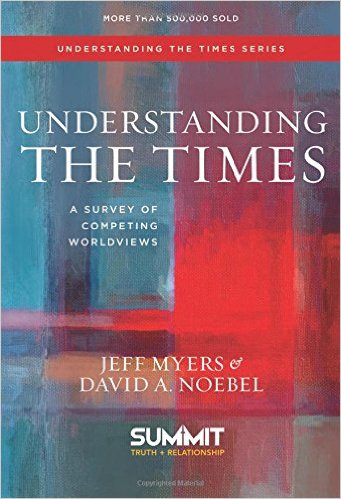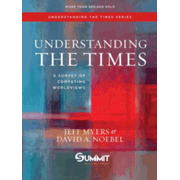Understanding the Times was written to help us figure out the answers to the big questions of life, questions such as, Where do we come from?, What happens when we die?, and How should we treat others? Understanding the Times is premised upon the idea that the world has an underlying order, that there are even “patterns that extend to life’s big questions,” and that it is “possible to figure out which patterns are good or bad, true or false, just or unjust” (p. 3).
Understanding the Times by David Noebel was first published in 1991. The book became the basis of an entire worldview curriculum, developed by Jeff Myers and published by Summit Ministries. That project spawned similar programs for younger students and inspired other authors and publishers to create other worldview education resources. Summit Ministries also offers on site worldview courses in Manitou Springs, Colorado. The impact of the book and programs has been immense.
Jeff Myers took over the reins at Summit Ministries upon David Noebel’s retirement, and since Understanding the Times had been around for 25 years and revised a few times, it was time for a major update. So much has changed in that time period that the book was needed a significant rewrite. In addition, the original book had purposely repeated material on the various worldviews within each section, but that arrangement turned out to be a bit cumbersome. So the new book is both updated and rearranged. While I liked and used the original book, the new version is much better. Students, teachers, and parents will all appreciate the fact that the new book is only 510 pages while the previous one was 896 pages, and the new book weighs about one pound less!
The patterns are presented within the context of the six worldviews that encompass most belief systems: Christianity, Islam, Secularism, Marxism, New Spirituality, and Postmodernism. Those worldviews themselves are then examined from the perspective of ten key academic disciplines since this is where we see worldviews in action. Those academic disciplines are theology, philosophy, ethics, biology, psychology, sociology, law, politics, economics, and history. A very helpful chart at the front of the book shows at-a-glance summaries of the six worldviews and how they are reflected in each of the ten academic disciplines.
The book opens with an introductory chapter, “The Battle of Ideas,” showing how patterns of thought and action emanate from the various worldviews and why this matters so much. Myers also explains here that the book is written from the bias of a Christian worldview since he and David Noebel both believe that the Christian worldview has the most accurate answers to the important life questions. Myers writes,
In a systematic analysis of how each worldview approaches the ten disciplines above, Christianity claims that an acknowledgement of God’s nature and character, and the life and work of Christ, will reveal capital “T” Truth (as opposed to isolated cultural or personal “truths”). As we will see, a robust Christian perspective of each of the disciplines is clear and compelling (p. 18).
The next six chapters are each devoted to one of the six worldviews. For each worldview, the book explains its origin and development as well as its major teachings and/or characteristics. It also explains how each worldview “answers” the big questions of life, the questions in the first paragraph as well as questions such as, Is there a God?, How do we know anything about God?, What is man?, and How should we live?
Developing these ideas even further is the job of the next ten chapters. Each of these chapters focuses upon one of the academic disciplines, looking more closely at how each of the six worldviews plays out in both the world of ideas and in reality.
Noebel and Myers do an excellent job of drawing upon the writings and work of those who advocate other worldviews to express their own thoughts, often with quoted material. (The book has extensive endnotes at the end of each chapter.) Understanding the Times occasionally will challenge its readers with heady philosophical ideas—it isn’t light reading. The glossary and the index at the end of the book are likely to prove very helpful to most readers.
This was true of the original book as well. To make the content of the book more accessible for high school students, Summit Ministries created a video-based program that used the book as a part of the course rather than the mainstay. Because the book was revised so drastically, the entire video-based course is also being revised. I will review it as soon as it becomes available. Given Summit Ministries’ wealth of experience in both teaching worldview and creating course material, I expect that the new course will be outstanding.










